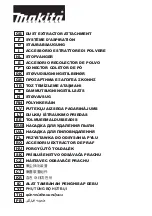
6-1135 3
Rev. 09/17/18
PLEASE REVIEW ALL WARNING INSTRUCTIONS PRIOR TO OPERATION. SAVE THIS MAN U AL FOR FUTURE REF ER ENCE.
AIR SUPPLY
Tools operate on a wide range of
air pressures. It is recommended
that air pressure measures 90 psig
at the tool with the trigger fully
depressed and no load applied to
the tool. Higher pressure (over 90
psig; 6.2 bar) raises performance
beyond the rated capacity of the
tool, which will shorten tool life
and could cause injury.
Always use clean, dry air. Dust,
corrosive fumes and/or water in
the air line will cause damage to
the tool. Drain the water from air
lines and compressor prior to run-
ning tool. Clean the air inlet filter
screen weekly. The recommended
hookup procedure can be viewed
in the Figure 1.
The air inlet used for connecting
air supply has standard 1/4" NPT.
Line pressure should be increased
to compensate for unusually long
air hoses (over 25 feet). Minimum
hose diameter should be 3/8" I.D.
and fittings should have the same
inside dimensions and be tightly
secured.
Always turn off the air supply,
drain hose of air pressure and
detach tool from air supply before
installing, removing or adjusting
any part or accessory on this
tool, or before performing any
maintenance on this tool.
Ensure an accessible emer-
gency shut off valve has been
installed in the air supply line
and make others aware of its
location.
Lubricate the air motor daily with
NAPA air tool oil. If no air line oiler
is used, run 1/2 oz. of oil through
the tool. The oil can be squirted
into the tool air inlet or into the
hose at the nearest connection to
the air supply, then run the tool. A
rust inhibitive oil is acceptable for
air tools.
WARNING: After an air tool
has been lubricated, oil
will discharge through the
exhaust port during the first
few seconds of operation. The
exhaust port must be covered
with a towel before applying
air pressure to prevent serious
injury.
LUBRICATION


































